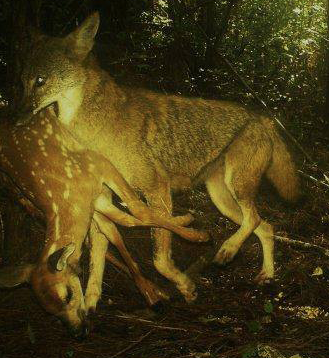Three state wildlife agencies have joined forces with one of the top white-tailed deer research labs in the nation along with a prestigious university as part of a groundbreaking, multi-year project into coyote behavior.
 The states have long battled coyote predation on white-tailed deer fawns and now, after about a decade of liberal doe harvests in some Southeast states, officials are concerned about the impact of coyotes on the deer population. Hunters are, too, and have expressed concerns about both situations: doe limits and how to manage and kill more coyotes.
The states have long battled coyote predation on white-tailed deer fawns and now, after about a decade of liberal doe harvests in some Southeast states, officials are concerned about the impact of coyotes on the deer population. Hunters are, too, and have expressed concerns about both situations: doe limits and how to manage and kill more coyotes.
It’s a tough situation, so bravo to the wildlife agencies for taking the reins on this. Here’s the skinny:
The Alabama Department of Conservation and Natural Resources has partnered with the University of Georgia Deer Lab in what UGA researchers are calling the most comprehensive study of coyote behavior in the southeastern U.S.
Other partners in the study include Princeton University and the natural resources departments of Georgia and South Carolina.
In January and February of 2015 and 2016, professional wildlife trappers will be trapping and placing GPS collars on coyotes in Barbour, Bullock, Macon and Russell counties in Alabama. Once fitted with the collars, the coyotes will be released back into the wild and researchers will begin collecting data on the animals’ movements every four hours for the next two years. Coyotes will also be collared in Georgia and South Carolina. Approximately 180 coyotes will be tracked in the three-state research area.
One objective of the study is to understand the predation threat coyotes pose to other wildlife including white-tailed fawns. Researchers will also study DNA samples from each of the collared coyotes to determine colonization routes for coyotes in the Southeast.
ADCNR’s Wildlife and Freshwater Fisheries Division (WFF) anticipates that the results of this study will help shape future wildlife management practices in Alabama.
“After collecting two years of data, this study should give us important information regarding the movement of coyotes in Alabama,” said Ray Metzler, acting WFF Wildlife Chief. “We will utilize the results to better understand how coyotes may be impacting other wildlife resources.
In the event of harvesting a GPS-collared coyote, hunters and landowners should return the collar to the UGA. A return address is printed on the collar.

Learn to Hunt and Kill More Predators with a Fantastic Call that Brings Them Close!
